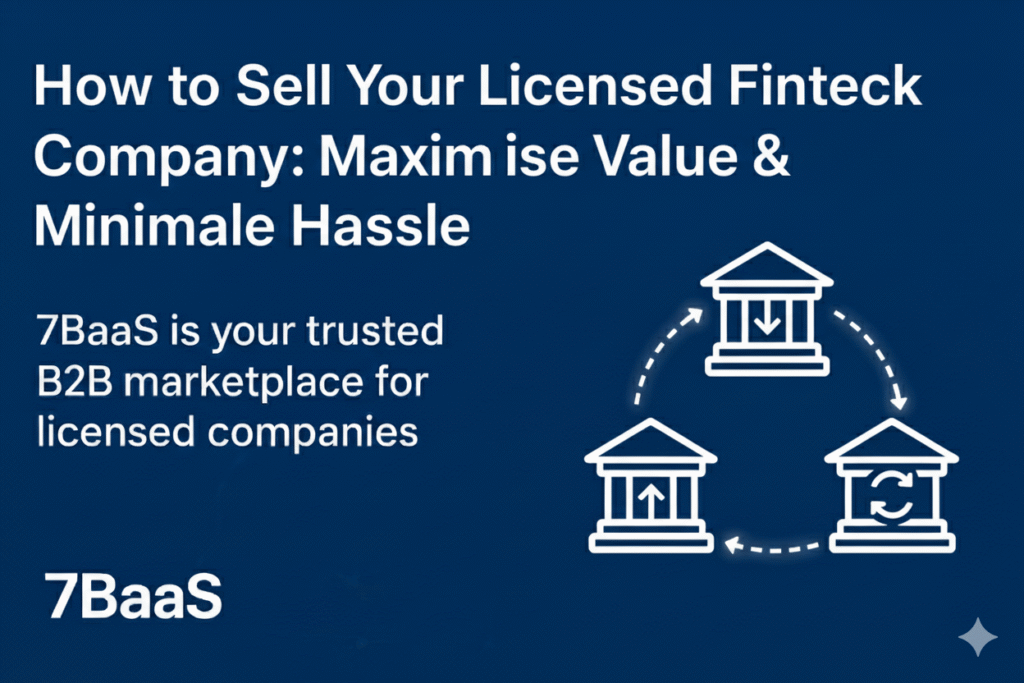Introduction
Selling a licensed fintech company — whether it’s an Electronic Money Institution (EMI), Money Services Business (MSB), Virtual Asset Service Provider (VASP), or Payment Institution (PI) — is not just a financial decision, it’s a strategic exit. Owners invest years building licensing credibility, compliance systems, banking relationships, and brand reputation. When the time comes to sell, maximizing value while ensuring a smooth transfer is the priority.
Yet, selling a licensed entity is very different from selling a standard business. Regulatory oversight, AML/KYC obligations, risk management frameworks, and even the buyer’s eligibility are central factors. Poor preparation can lead to deal collapse, licence revocation, or heavily discounted valuations.
In this comprehensive guide, we’ll walk through:
-
The factors that influence valuation of licensed entities.
-
How to prepare your business for sale.
-
Key legal and compliance steps in the transfer process.
-
Mistakes to avoid when selling.
-
Why using a trusted marketplace like 7BaaS helps maximise return and minimise hassle.
1. Why Licensing & Compliance History Drives Value
For buyers, the most important aspect of your company is its regulatory standing. A clean compliance record makes your company more attractive and allows you to command a premium price.
Key factors buyers assess:
-
Regulatory compliance history: Has your business ever faced warnings, penalties, or restrictions?
-
AML/KYC standards: How robust and well-documented are your anti-money laundering procedures?
-
Banking relationships: Does the company have active, stable banking and PSP (Payment Service Provider) accounts?
-
Regulator reputation: How cooperative has your regulator been with the business?
Tip: Collect and organise regulatory correspondence, past audit results, and compliance logs. A transparent record signals reliability and reassures buyers.
2. Preparing Your Licensed Company for Sale
A well-prepared business sells faster, at a better price, and with fewer disputes. Before listing your company, review and organise the following:
a) Corporate Documentation
-
Certificate of incorporation, articles of association, shareholder register.
-
Board structure, shareholding percentages, resolutions.
Why: Buyers must see a clean ownership structure to avoid hidden liabilities.
b) Licensing Documents
-
Copies of licences (EMI, MSB, VASP, PI, etc.)
-
Proof of renewal and ongoing validity.
-
Any restrictions, extensions, or exemptions.
Why: Proves regulatory legitimacy and clarifies what services can be offered under the licence.
c) Financial Records
-
Audited financial statements (last 2–3 years).
-
Management accounts and revenue forecasts.
-
Operating expense breakdown.
Why: Helps buyers assess profitability, growth, and sustainability.
d) Client & Partner Contracts
-
Active client agreements.
-
Banking/PSP contracts.
-
Service provider agreements (KYC providers, IT vendors, etc.).
Why: Banking continuity and service delivery stability add immediate value.
e) Operational & Technical Setup
-
AML transaction monitoring tools.
-
KYC/KYB onboarding systems.
-
IT security architecture.
-
Compliance manuals and SOPs.
Why: Buyers want to know if they can continue operations without disruption.
3. How to Value Your Licensed Fintech Business
Valuing a licensed entity is both an art and science. Unlike traditional businesses, licensing itself often carries intrinsic value.
Main valuation factors:
-
Licence type & jurisdiction: EMI licences are usually valued higher than smaller MSBs due to their broader scope. Licences in strong financial hubs (e.g., UK, EU, Singapore, Hong Kong) command higher prices.
-
Regulatory record: Clean compliance = premium valuation. Any investigations = discount.
-
Banking access: Licences with active, established bank accounts are worth more.
-
Operational readiness: Automated AML/KYC and strong tech systems add resale value.
-
Revenue & profitability: Companies with active clients, stable cash flow, and growth prospects receive higher multiples.
Example:
-
A clean, unused Canadian MSB licence might sell for $50k–$80k.
-
An operating UK EMI licence with banking partners could sell for $500k–$1M+.
(Exact pricing varies — at 7BaaS, we provide valuations case-by-case.)
4. Legal & Compliance Transfer Process
The transfer process is often the most complex part of selling a licensed business. Each jurisdiction has specific rules on change of control and licence ownership transfers.
Typical steps include:
-
Confidentiality (NDA): Signed between seller and potential buyers.
-
Due diligence: Buyer reviews financials, legal structure, compliance systems, and client history.
-
Regulatory approval: Some regulators require formal approval before a sale/change of control.
-
Share transfer / sale agreement: Legal transfer of ownership shares.
-
Bank account transition: Critical step; must be coordinated to prevent closure.
-
Payment & escrow: Funds released only after legal transfer confirmed.
-
Post-sale obligations: Seller may provide handover training or consulting for a defined period.
Without professional support, transfers can fail. Regulators may revoke licences if documentation is incomplete or if the buyer doesn’t meet “fit and proper” tests.
5. Common Mistakes Sellers Make
Many owners underestimate the complexity of selling a licensed entity. Some common pitfalls include:
-
Incomplete documentation: Missing contracts, outdated AML manuals, or unclear shareholder records.
-
Non-disclosure: Hiding compliance issues, fines, or banking problems. These always surface in due diligence.
-
Overvaluation: Unrealistic pricing deters buyers.
-
Ignoring regulator requirements: Each jurisdiction has strict rules; failure to comply risks licence cancellation.
-
Banking disruptions: Not securing continuity plans with PSPs and banks.
Solution: Work with experts (like 7BaaS) who know the regulator landscape and can manage negotiations.
6. Why Use 7BaaS Marketplace to Sell
Selling directly can be risky, slow, and stressful. With 7BaaS Marketplace, you gain:
-
Verified buyers: Access to qualified investors seeking licensed entities.
-
Compliance-first process: Every transfer is structured with regulators and banks in mind.
-
Valuation guidance: Get a realistic, market-driven valuation.
-
Confidentiality protection: Deals managed discreetly with NDAs.
-
End-to-end support: From listing to final ownership transfer.
-
Global exposure: Buyers across Asia, Middle East, UK, US, LatAm, and Europe.
FAQs
1. How long does it take to sell a licensed fintech company?
Anywhere from 4 weeks (for unused, clean licences) to several months (for active EMIs with large client bases).
2. Can I sell an unused licence?
Yes — unused licences are attractive to buyers who want a quick market entry without going through a lengthy application.
3. Do buyers need regulator approval?
In most cases, yes. Buyers must meet the regulator’s “fit and proper” criteria.
4. What if I only want to sell part of my company?
Partial share transfers or joint ventures are possible. This depends on buyer appetite and regulator approval.
5. How does 7BaaS protect sellers?
Through escrow arrangements, NDAs, compliance support, and managing buyer due diligence.
Conclusion & Call to Action
Selling a licensed fintech company is a major opportunity — but also a potential regulatory minefield if handled poorly. From valuation and compliance to buyer vetting and regulator approval, every step matters.
By working with 7BaaS, you gain a trusted partner who understands both the value of your licence and the complexities of regulatory transfer.
Ready to sell your company?
Submit your licensed company for sale on 7BaaS Marketplace today and get a free valuation with compliance guidance.



